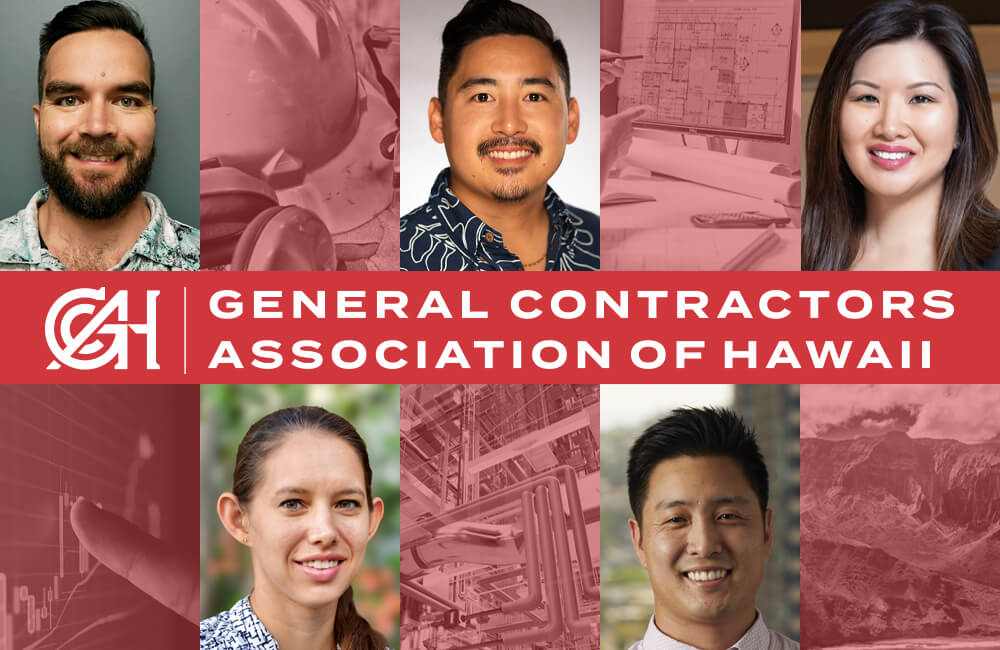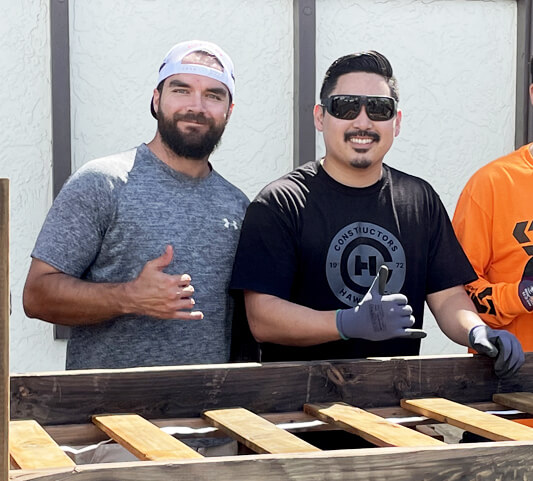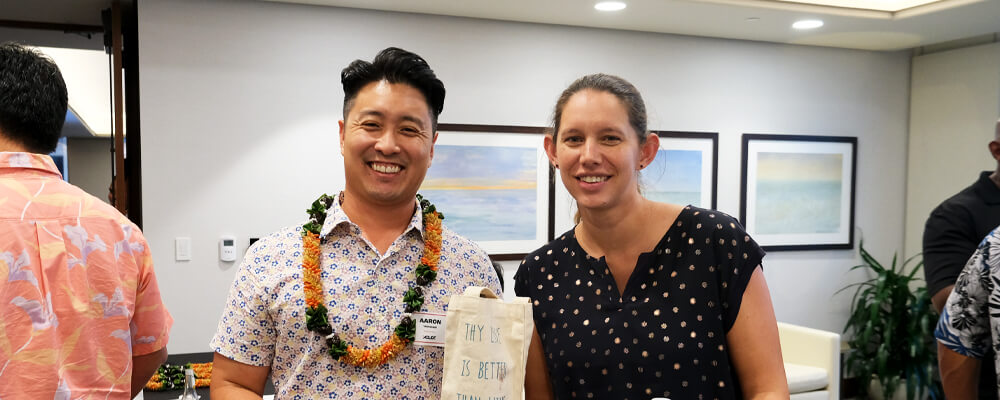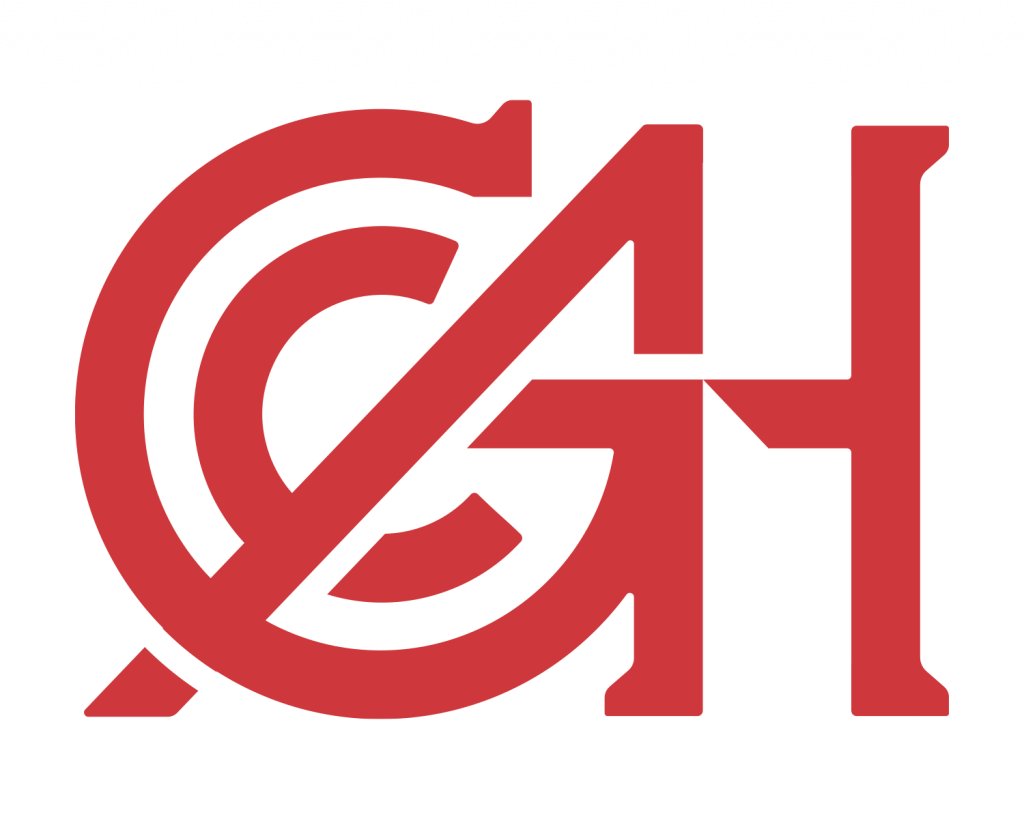
GCA Young Leaders’ Career Journeys & Advice for the Next Generation
Five GCA members recently shared what it takes to become a leader in Hawaii’s challenging construction industry. Justin Cornair of Cornair Remodeling, Inc.; Travis Higa of Constructors Hawaii, Inc.; Claire Thompson of Nordic PCL Construction; Tiffany Tabbal of Manageability, LLC; and Aaron Yamasaki of Swinerton, have all made notable progress in their construction career and attribute their rise in the industry in large part to the support they received from mentors, their commitment to continuous learning, and their desire to support the community. They each have collected a treasure trove of wisdom in their journey, and while it has not always been an easy road, they are all proud of their progress and have their sights set on the future. Read more.
The Influence of Mentors
Behind every great leader is a great mentor or advisor. You need someone who sees your potential, believes in you, and wants you to succeed. That’s especially true for the construction industry. There is a lot to learn when starting a career in the construction industry that may not be taught in school. And in Hawaii, where relationships are so important, a mentor can help you expand your network to further position you for success.

Justin Cornair (right) and Travis Higa at the 2023 Construction Leadership Council (CLC) Community Project event. The CLC and other volunteers put together bunk beds for those in need through Sleep In Heavenly Peace.
Travis Higa, Project Manager with Constructors Hawaii, Inc., said his most supportive mentor was his first project manager. “I was extremely fortunate that he invested so much time in me as a fresh engineer. He was patient enough to spend time reviewing my work as I wrote and re-wrote RFIs and emails. If I didn’t understand a detail, he would take me out to a project to go over it,” Travis recalled. “His willingness to invest the time and energy into my development as a young professional was instrumental in laying a strong foundation for my career. The valuable skills and even life lessons he passed on continue to benefit me to this day.”
Justin Cornair, Vice President of Kaneohe-based Cornair Remodeling also had positive mentors in his life, including his father, Rex Cornair. “Construction provides many recurring issues that can appear unique when looked at from a singular perspective,” he said. “My mentors have all provided me context and insight into the environment as they've seen or experienced it. I've been helped the most by my mentors who can identify the similarities to their experiences and help me to narrow down my actions.”
Claire Thompson, Special Projects Manager of Nordic PCL Construction, said her dad has been a mentor to her. Even though he is not an engineer, Claire said her dad is very active in the community and reminds her that all relationships are very important because he has told her: “You never know who you might meet.”
Aaron Yamasaki, Vice President, Division Manager of Swinerton, added: “First and foremost, a mentor needs to be someone who is genuinely willing and able to devote time into the mentor-mentee relationship. In past mentorships, I’ve appreciated mentors who have challenged me to broaden my perspectives, and who have expanded my network by connecting me with people in theirs.”
Tiffany Tabbal, owner of Manageability,LLC, said her mentorship started when she was still a student. “The most influential mentor is my now business partner (Mark Tawara), whom I met at Business Night while I was a student at the UH Shidler College of Business. After that event, I reached out for an internship that started my career in the AEC industry.”
Qualities of a Great Mentor
Construction industry mentors offer a depth of wisdom that can only be gained from years of experience. Their time and advice are priceless. That doesn’t mean mentors will spare you from making bad mistakes because a good mentor will let you make your own decisions, knowing that even failure is part of the learning and the professional growth process.
“I have never been one to take direction well, so for me it is a balance of knowing when to help me out and when to let me get burnt,” said Justin. “I feel a mentor's role is to help you identify the potholes in the road but not necessarily keep you from hitting them. Experience is the best teacher!”
“A great mentor is approachable, supportive, and willing to share both their successes and failures to help you learn and grow.”
Tiffany Tabbal,
Manageability, LLC
Tiffany, who said she never thought she would one day own her own business, said: “A great mentor is approachable, supportive, and willing to share both their successes and failures to help you learn and grow. My mentors have helped me by providing strategic advice, introducing me to key contacts in the industry, and offering insights into best practices. They’ve also been instrumental in helping me develop my leadership skills and navigate difficult decisions. Their support and encouragement have given me the confidence to take risks and pursue my ambitions.”
Travis said: “The most valuable qualities in a mentor are approachability and commitment. A mentor should provide a supportive environment to build communication and trust and be someone that is committed to putting the time and effort into their mentee."

Aaron Yamasaki (left) and Claire Thompson at the CLC 2023 Leadership Panel event.
Advice for the Next Generation of Leaders
As with other industries, construction is constantly evolving. Navigating the changes takes special qualities.
Justin said the most difficult challenges facing young leaders in construction today is dealing with a workforce spanning multiple generations. “Adapting to the changing environment and dealing with generational differences is important.” He has good advice for emerging leaders: “Be patient. The fast-paced world we live in today is not reflective of how everything should go. There will be good times and there will be bad times. You will fail over and over again. Nothing is promised and everything must be earned. This path is not an easy one to walk but if you've got the grit to stick it out and keep getting back up then the industry will support you. Utilize the resources available and never burn a bridge - support will come from places you never expected so keep your eyes open, head down and keep trying!”

Tiffany Tabbal
Tiffany also observed the natural, creative tension between the generations: “The most challenging aspects involve finding a balance between innovative approaches and established methods, effectively managing diverse teams, and remaining adaptable in a constantly changing industry environment... I’d like to emphasize the importance of diversity and inclusion in the construction industry. Diverse teams bring a wealth of perspectives and ideas that drive innovation and success. As leaders, it’s our responsibility to create an environment where everyone feels valued and has the opportunity to contribute and grow.”
“I believe the most important qualities to rise in the construction industry are grit, resilience, adaptability, and being proactive. These traits help you navigate challenges and seize opportunities that come your way,” Tiffany added.
“It's important to care about what you do. There is a lot to learn and lots of work and it's important to be willing to take on giant stretch roles. Ask the right questions to get it done,” advises Claire. “Construction is a technical field, but at the end of the day, it's a people business. How you treat people is important. You also need people skills, and must connect with co-workers, architects, and subcontractors.”
“You are going to make mistakes along the way, but they are not career- or project-ending mistakes. Don't stress out; learn from them,” she said.
“Good communication cannot be undervalued, and typically improves with the strength of personal relationships. Don’t take the easy way out, meet the people you work with and start forging relationships. They take time to grow!”
Aaron Yamasaki,
Swinerton
Aaron added that technology can be a hindrance. “With the ever increasing availability of technology, and the adoption of virtual meetings, it’s become easy to remain semi-anonymous and attempt to do business from behind a screen and keyboard. For the time being, construction remains a service industry and it requires groups of people to come together to work towards achieving a common goal. Good communication cannot be undervalued, and typically improves with the strength of personal relationships. Don’t take the easy way out, meet the people you work with and start forging relationships. They take time to grow!”
He added that is important for emerging leaders to “proactively take action to make a positive impact on anything you’re involved in, no matter who is responsible for the tasks at hand. It is also important to be honest with yourself about your strengths and weaknesses, and having the humility to surround yourself with a team who shores up your shortcomings. Have eternal curiosity, a desire to continuously expand our skills and capabilities, and a willingness to pay it forward by teaching what you know. And finally, always take time to enjoy the moment and regularly reflect on your journey. A pure grind without the recognition of the progress you’ve made can easily lead to burnout.”
Travis said that when he was starting his career, he wished he understood the value of networking within the construction industry. “While technical skills are essential, having a network of industry contacts can provide you with new industry connections, support, knowledge, and help grow your leadership skills.
“The GCA’s CLC is the perfect committee for younger construction professionals to get involved with to provide all of the above," added Travis. "Get involved through industry organizations like the GCA’s CLC or professional development opportunities. In addition to growing yourself, your contributions are vital for shaping the future of the industry.”
Justin: “Patience, a strong work ethic and a lot of emotional intelligence. Nothing worth having comes easy!”
We hope you enjoyed this featured article! Comments or feedback? Send an email to communications@gcahawaii.org.
Mahalo!
